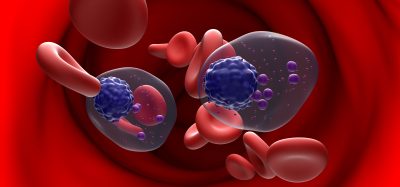KRAS variants in human pancreatic cancer: new key findings
Posted: 4 October 2024 | Drug Target Review | No comments yet
Researchers have identified underlying KRAS mutations which drive associated risk of particular clinical outcomes.


Researchers at Weill Cornell Medicine, New York-Presbyterian and Memorial Sloan Kettering Cancer Center, alongside other institutions, have revealed significant findings about variants of KRAS mutations which provide valuable information regarding patient prognosis.
KRAS mutations occur in around 95 percent of individuals who have pancreatic ductal adenocarcinoma (PDAC). The most common alleles are KRAS-G12R, KRAS-G12D and KRAS-G12V.
Dr Rohit Chandwani, assistant professor in the departments of surgery and cell and developmental biology, and the Mildred L. and John F. Rasweiler Research Scholar in Cancer Research at Weill Cornell Medicine, was senior author of the paper. He commented: “We found that there are significant differences among these mutations…we suggest that clinical guidelines should be revised to recommend routine molecular testing in all patients with pancreatic cancer.”
Molecular profiling for late-stage PDAC patients, or those with locally advanced or metastatic disease, is recommended by current National Comprehensive Cancer Network guidelines. Despite it not being recommended for early-stage patients with cancer confined to the pancreas, Dr Chandwani highlighted that understanding how mutations affect the behaviour of pancreatic tumours could help guide treatment.
Genomic sequencing and spatial transcriptomics
According to the National Cancer Institute, PDAC accounts for over 80 percent of pancreatic cancer cases. Pancreatic cancer has a five-year survival rate of around 13 percent, making it one of the deadliest malignancies.
The researchers studied deidentified data from 1,360 patients who had pancreatic tumours removed at Memorial Sloan Kettering to improve understanding the outcome of early and late-stage pancreatic cancer. Of these patients, 29 percent had early-stage cancer and 71 percent had late-stage tumours that had metastasised. Genomic sequencing was conducted in tumours from 397 patients to identify genetic mutations associated with PDAC.
Also, the team evaluated the tumours of 20 patients from New York-Presbyterian/Weill Cornell Medical Center and Weill Cornell Medicine using spatial transcriptomics. RNA sequencing was used to study the gene activity in 100 tumours from patients at the Ontario Institute of Cancer Research. Then, the findings were validated on genetic mutations using mouse models.
Variations in KRAS tumours
The most common mutation was KRAS-G12D, occurring in 35 percent of study patients. This was associated with aggressive cancer and the worst outcomes, as well as increased rates of distant recurrence, or metastatic disease arising after an operation to remove a tumour. Although more research is required, Dr Chandwani stated that patients who had tumours with these types of mutations could potentially benefit from chemotherapy as part of their treatment plan.
Both KRAS-G12V, present in about 30 percent of patients, and KRAS-G12R, present in 15 percent of patients, were associated with better overall survival. Dr Chandwani added: “KRAS-G12R is unique in that it is a mutation that seems to only occur in pancreatic cancer and not in the other cancer types associated with KRAS mutations, such as lung cancer.”
Furthermore, KRAS-G12R was associated with increased rates of recurrence in and around where a pancreas resection was performed. Patients with this mutation could benefit from radiation to decrease the likelihood of local recurrence. However, the investigators noted that further studies are needed to assess this strategy.
Dr Chandwani concluded: “When we approach treating these patients, we should be aware of their underlying KRAS mutations and aim to base our treatments on a thorough understanding of the patient- and tumour-specific factors that drive associated risk of various clinical outcomes…This is an important next step.”
This study was published in Cancer Cell.
Related topics
Cancer research, Disease Research, Genetic Analysis, Genomics, Oncology, Sequencing, Therapeutics
Related conditions
Pancreatic ductal adenocarcinoma (PDAC)
Related organisations
Memorial Sloan Kettering Cancer Center, New York-Presbyterian, Weill Cornell Medicine
Related people
Dr Rohit Chandwani (Weill Cornell Medicine)







